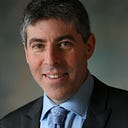A guy I admire suggests that it's best to have "strong opinions, weakly held."
By that, he means you should form opinions based on the known facts and your (or a trusted source's) opinion so that you can make somewhat informed decisions and not get stuck in (metaphoric) neutral gear. However, and this is the crucial part, if your results differ from what your opinion would predict, update your opinion without sticking to it out of stubbornness.
This is similar to the scientific method, where we don't know all the facts even, let alone know the definitive underlying laws. Thus, we make observations, construct a hypothetical model explaining them, use that model to predict new observable results before testing, then test to see if our prediction is valid. If it is, congratulations, we have a viable model. We then keep making as many predictions as we can to further test our model at ever-greater precision.
1 min readApr 20, 2024
Written by Opher Ganel
Consultant | systems engineer | physicist | writer | avid reader | amateur photographer. I write about personal finance from an often contrarian point of view.
